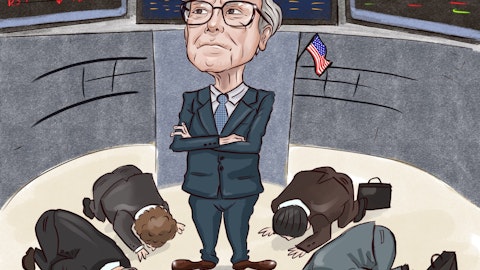4. Live Nation Entertainment, Inc. (NYSE: LYV)
Number of Hedge Fund Holders: 46
Live Nation Entertainment, Inc. (NYSE: LYV) is a California-based entertainment company that manages ticket sales for live entertainment in the United States and internationally. It was founded in 2010 and is placed fourth on our list of 10 best rebound stocks to buy now. The company has four different segments: concerts, ticketing, sponsorship, and advertising. The firm owns and operates at 155 different entertainment venues in the United States and Canada, as well as another 76 venues internationally. It is headquartered in Beverly Hills.
Live Nation has been on an upward trajectory since the lockdown restrictions were lifted and jumped at the beginning of this month as New York Governor Andrew Cuomo lifted a ban on concerts, paving the way for the firm to organize limited gatherings in the city. In February, investment bank Berenberg raised the price target of Live Nation on the back of the return of live events. At the end of the fourth quarter of 2020, 46 hedge funds in the database of Insider Monkey held stakes worth $1.6 billion in the firm, down from 50 in the preceding quarter.
Oakmark Global Fund, in their Q4 2020 investor letter, mentioned Live Nation Entertainment, Inc. (NYSE: LYV) and emphasized their views on the company. Here is what Oakmark Global Fund has to say about Live Nation Entertainment, Inc. in their Q4 2020 investor letter:
“In 2006, we initiated our position in Live Nation, the global entertainment company that handles promotion, venue management and ticket sales for live events. Live Nation was spun out of the former Clear Channel Communications in late 2005. In our view, spinoffs often represent attractive opportunities because investors frequently undervalue the new company. We believed this was the case with Live Nation, especially given its initially small market capitalization. As well, when spinoffs are freed from their parents, they typically benefit from intensified management focus and more flexible capital allocation policies. In Live Nation’s case, the spinoff helped make possible the merger with Ticketmaster in 2010, which materially improved the business franchise. Although these factors alone might have made Live Nation a good holding for the Fund, an unexpected technology helped to boost the company’s fortunes: streaming. As the advantages of streaming convinced consumers to reduce or even eliminate their purchases of media, such as CDs and DVDs, artists began to tour more, thereby providing a tailwind to Live Nation’s operations. This accelerated growth in the company’s intrinsic value per share, which in turn generated numerous increases in our sell target for the holding, enabling us to continue to own the shares in the Fund for 14 years. We typically target a three- to five-year holding period for our equity investments, but we love opportunities like Live Nation, which achieve unanticipated intrinsic value growth.”




